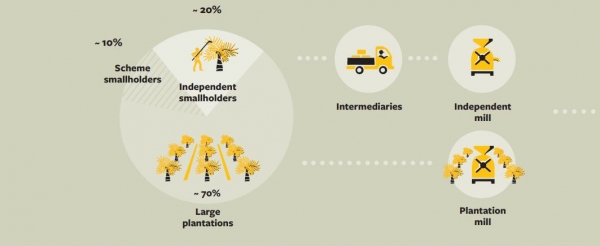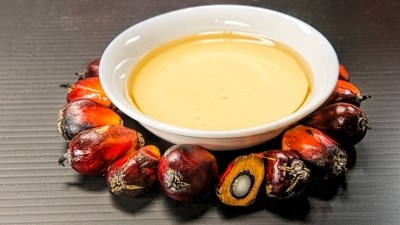Palm oil: Report reveals split supply chain strategy to address EUDR

According to a report by the Palm Oil Transparency Coalition (POTC), which comprises businesses collaborating to eliminate deforestation and exploitation from the palm oil production sector, importers are planning to split their supply chains. Palm materials that cannot be fully traced back to their origin will be directed to regions outside the EU.
The publication outlines how smallholders are likely to face disadvantages and exclusion from EU supply chains as a result due to the challenges in tracing palm volumes back to individual plantations.
Sian Allen, a consultant at 3Keel and one of the report's authors, speaking to this publication, noted that "traders are navigating two conflicting demands. Firstly, there is a crucial need to avoid excluding smallholders from the supply chain, as palm oil is integral to the livelihoods of many communities in Malaysia and Indonesia. Excluding smallholders could discourage them from adopting sustainable practices, potentially exacerbating deforestation.
"Secondly, there is pressure to adhere to the EU's EUDR."
In response to these demands and the time constraints involved, some traders say they aim to safeguard smallholders by implementing a split supply chain: goods from smallholders will be diverted away from Europe, while products from mills primarily relying on large concessions will be supplied to Europe. This approach, they say, allows them to balance supporting smallholders with regulatory compliance, addressing both concerns simultaneously.
The emerging split, however, means smallholders linked to deforestation may continue this practice if excluded from supply chains with deforestation and conversion free (DCF) requirements, therefore contributing to ongoing deforestation and conversion, warned Allen.
The approach also disadvantages smallholders who already apply responsible growing practices and don’t engage in deforestation, she explains. They are excluded from volumes entering the EU, as the way smallholder supplies are aggregated means there is often limited traceability to plantation level.
Expanded due diligence legislation
Allen advocated for the introduction of due diligence legislation to mitigate this risk on a broader scale. Potential solutions are forthcoming, with upcoming legislation in the UK and discussions in the US offering regulatory avenues, she told us.
“It would be great to see due diligence legislation being adopted to such an extent that companies recognize the need to go beyond merely providing supplies with a certain level of traceability and assurance of being deforestation-free for Europe. Instead, they would realize the importance of applying these standards to their entire supply chain.”
She observed a trend of traders and importers postponing target dates for achieving traceability and deforestation-free commitments over time. Regulatory compliance is imperative, and the postponement of deadlines underscores the necessity of comprehensive due diligence, she stressed.
Massive decline in forest loss linked to palm oil cultivation
Reports from organizations like the World Resources Institute (WRI) indicate a significant decrease in forest loss in Indonesia and Malaysia in recent years.
“Palm oil-related deforestation peaked around 2015 or 2016 and has since notably declined. Several factors contribute to this trend, including the adoption of NDPE (No Deforestation, No Peat, No Exploitation) commitments throughout the industry, enhanced traceability measures, and improved land monitoring. Government actions, such as the implementation of the Malaysian Sustainable Palm Oil (MSPO) and Indonesian Sustainable Palm Oil (ISPO) standards, also play a role.
“Additionally, the previous deforestation has reduced the available forested land, further limiting opportunities for large-scale deforestation. Despite these positive developments, challenges persist, particularly within smallholder plantations, where instances of deforestation may occur at a smaller scale and are harder to monitor effectively within the supply chain,” said Allen.
Cross-commodity deforestation where companies in palm oil supply chains are being linked to deforestation in the production of timber and mining activities is also a focus issue for the POTC. “We have been trying to ask more questions of palm oil traders in terms of what they are doing when their suppliers are deforesting in non-palm oil sectors.”
A diverse base of more than three million smallholders produce roughly 30% of global palm oil, according to a report from Solidaridad.
A paper in Nature Sustainability maintains that more robust support for independent smallholders in Indonesia that grow oil palm on their own land could secure rural livelihoods without increasing forest loss.
Optimizing traceability processes
When it comes to companies meeting their commitments regarding deforestation and traceability in smallholder supply chains, it's undoubtedly a challenge. This difficulty doesn't stem from the assumption that every smallholder engages in deforestation practices; indeed, many smallholders are conscientious and adhere to these requirements. However, the struggle lies in tracing these volumes back to individual smallholders to ensure they maintain a deforestation-free status, explained Allen.
“The complexity arises from the structure of these supply chains, where smallholders typically sell their produce to local traders, who may subsequently pass it on to additional traders before reaching the mill. Unfortunately, crucial geolocation plot information often fails to transfer at each step of this process, ultimately not reaching the mills. Consequently, when palm oil arrives at a mill, it may lack vital details such as the village name, smallholder name, or specific coordinates. This absence of information can be attributed to either a lack of data sharing among local traders or confidentiality constraints imposed on them.
“Efforts are underway by governments in Indonesia and NGOs to map smallholders and mitigate this risk. However, the challenge persists in integrating this information into the traceability processes that extend from the mill to the refinery, global importer, and to consumer goods companies. Closing this gap requires collaborative efforts and innovative solutions to ensure transparency and accountability throughout the supply chain,” noted Allen.
Human rights
In terms of progress made in addressing human rights within palm oil supply chains, there have been notable advancements, albeit with variations among different importers, according to Allen.
“One significant method of addressing human rights concerns is through RSPO certification, which currently stands as the most verifiable approach, widely used, for meeting human rights commitments.
“Furthermore, engagement with the supply chain plays a crucial role. This involves activities such as distributing questionnaires to suppliers, providing training on human rights and risk identification, and conducting on-the-ground audits, especially with high-risk suppliers. These audits involve a thorough risk assessment process to identify regions or mills with higher risks and subsequently conducting audits in those areas.
“Another critical aspect, particularly for palm oil traders, is the establishment of grievance mechanisms both within their own operations and throughout their supply chain. While many companies have implemented grievance mechanisms, their accessibility to workers varies significantly. Factors such as availability in workers' languages, proactive sharing of mechanisms, fear of retaliation, and the channels through which grievances are addressed all influence the effectiveness of these mechanisms.”
There is a recognition that there is room for improvement in ensuring that grievance mechanisms are not only present but also accessible and effective.
Political tensions
In terms of why both Indonesia and Malaysia are of the view that the EUDR will harm their economic interests as major producers and exporters of palm oil, Allen believes much of that resistance stems from the legislative efforts and initiatives undertaken by governments in those countries: “They are aiming to ensure that their ongoing work in combating deforestation is acknowledged and valued globally. Rather than introducing separate regulations that may not align with the existing efforts on the ground, these governments seek recognition for their existing measures.”
With multiple stakeholders pushing for various initiatives, there's a need for collaboration and dialogue among companies, governments, and other entities, she said. “It's essential to ensure that these actions complement each other rather than conflict.”
Recommendations
The report makes 11 recommendations for POTC members, importers, and NGOs, including:
Members should provide support to initiatives that will drive at-scale inclusion of smallholders in certified palm supply chains in the face of smallholder exclusion due to EUDR requirements.
Importers should develop targets for full traceability to plantation in third-party supply chains, while establishing robust satellite monitoring beyond own supply to ensure risk of deforestation and conversion is adequately addressed.
NGOs should continue to support and provide capacity-building on projects that focus on linking smallholder certification and traceability to importer sourcing practices whilst engaging the EU Commission on the risk of a split market and implications.
POTC was established in 2016 to address the issue of limited transparency surrounding importer commitments on deforestation and exploitation, and a desire originally from retailers to assess the performance of traders present in their palm supply chains.
Its members include Ahold Delhaize, ALDI Nord, ALDI South Group, Casino Group, The Co-operative Group (UK), Eight Fifty Food Group, Kellogg, Marks & Spencer, METRO AG, Mondelez, Morrisons, Nestle, Sainsbury’s, Tesco, Waitrose and Partners, and Walgreens Boots Alliance.
















